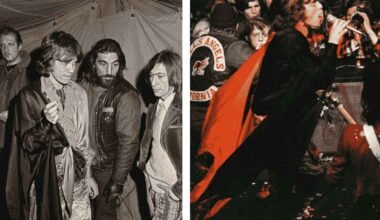Led Zeppelin’s career is filled with beloved creations, from the explosive blues rock of their debut album to the ethereal sounds of Led Zeppelin IV and the hard-hitting progressive rock of Physical Graffiti. Their discography is full of highlights that have stood the test of time, cherished by fans and critics alike.
The band—Robert Plant, Jimmy Page, John Paul Jones, and John Bonham—dominated the rock scene with a power that easily filled the gap left by The Beatles. Each member’s individual brilliance merged into a force that set them apart from their contemporaries. Whether on stage or in the studio, Zeppelin’s intent was always palpable.
Unlike The Beatles, Led Zeppelin thrived on collaboration, with each member contributing their strengths to the songs. They operated like a well-oiled machine, always working together as a unit. But this didn’t mean they were immune to producing some controversial tracks. Some fans and even band members themselves have debated over a few songs. Among these, one of the most infamous is “D’yer Mak’er” from their 1973 album Houses of the Holy.
Intended as a reggae-inspired track, “D’yer Mak’er” has often been seen as one of Zeppelin’s weakest songs. Many feel it drags down an otherwise stellar album. The song has been described as a failed joke, a rare misfire in an otherwise exceptional career. Even drummer John Bonham had issues with the track, a sentiment reflected in his performance.
John Paul Jones revealed that Bonham disliked both the reggae genre and its accompanying drumming style. His frustration with the song resulted in a lackluster effort, affecting the final product. “John was interested in everything except jazz and reggae,” Jones shared in Chris Welch’s John Bonham: A Thunder of Drums. “He didn’t hate jazz, but he hated playing reggae. He thought it was boring.”
Bonham’s drumming, typically characterized by his thunderous style and technical prowess, lacked the usual punch on “D’yer Mak’er.” Jones remembered how Bonham stuck to the same shuffle beat throughout, refusing to experiment or push the groove.
“It would have been all right if he had worked at the part,” Jones remarked. “But he wouldn’t, so it sounded dreadful.”
Jones, who usually complemented Bonham’s drumming with his basslines, agreed that the song could have been better. He pointed out that their rhythm section didn’t adhere to the crucial rule of reggae, where the bass and drums must be tightly synchronized. He candidly noted, “The whole point of reggae is that the drums and bass really have to be very strict about what they play.”
Despite their incredible synergy in other songs, “D’yer Mak’er” stands as an example of Led Zeppelin’s rare missteps. The song’s failure highlights how even rock legends like Bonham and Jones could struggle when venturing into unfamiliar territory. While Zeppelin’s legacy remains untouchable, the track serves as a reminder that even the greatest bands face creative challenges.







